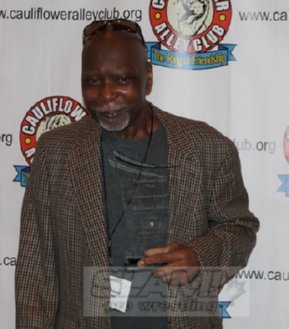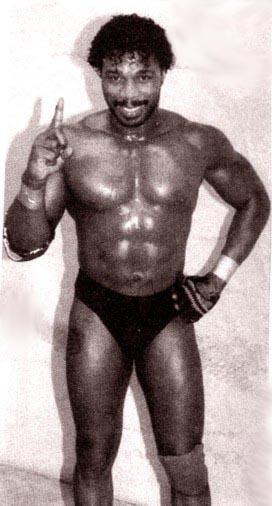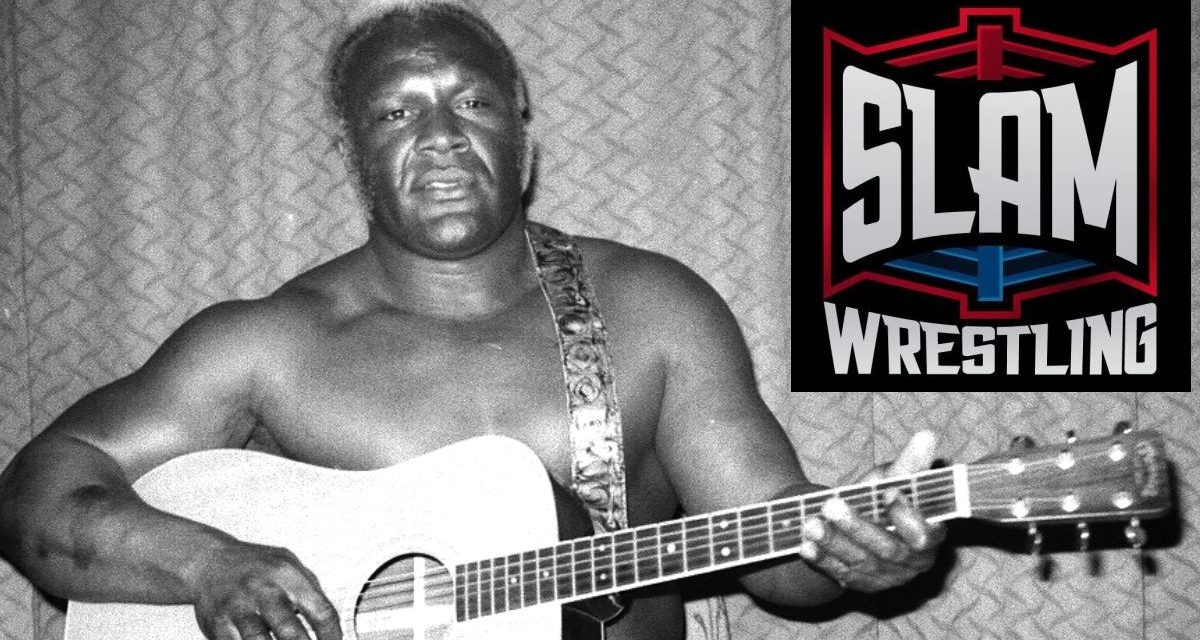Wrestling legend Brickhouse Brown has passed away. He was 57-years-old.
Born Frederick Seawright, Brown died after a long battle with cancer, which took 100 pounds off his powerful frame but never touched his spirit.
In fact, knowing his mortality, Brown said following his cremation, his ashes would be available to anyone who wanted some.
“I’m dead serious — no pun intended. If you can’t make a joke about it … Oh, they gave me six months to live, what am I going to do? I have had a wonderful life, a blessed privileged life, I have traveled all over the world, I have met some fabulous people.”
Let it be said that the greatest moment of Brickhouse Brown’s wrestling career came not when he tore through opponents to become Southern heavyweight champion or a world tag team champion.
Instead, it was when he gingerly navigated his way to the podium at the Cauliflower Alley Club reunion in May 2018 to accept the club’s inaugural Courage Award and left not a dry eye in the house.

Brickhouse Brown with the first CAC Courage Award. Photo by Greg Oliver
Brown’s spirits were lifted when the CAC and several members helped him get to the reunion in Las Vegas, where he said the surprise Courage Award left him short of words for once. “I can honestly say if it wasn’t for the CAC coming to my aid, I would not be here looking at all you beautiful faces,” Brown said. “This is one of the best moments I ever had with the exception of the birth of my children.”
Among those moved in the audience was Frankie Kazarian, who tweeted, “RIP Brickhouse Brown. I’m so glad I was at the @CACReunion this year to hear your powerful and inspirational speech. Godspeed.”
“I was a Brickhouse Brown fan as a child,” Sean Waltman added on Twitter. “He looked great, He was great in the ring & he was very kind to all the fans, including me. I can’t praise @CACReunion & @Killerbee1B enough for what they did for Brickhouse recently by helping him & honoring him this year in Vegas.”
“I didn’t know there was so much love in the wrestling business until I was diagnosed with Stage 4 prostate cancer,” Brown said as he returned to his seat following his final standing ovation.
Known for his hard-charging style in and out of the ring — his shoot interviews are rated for adults only — Brown wrestled into the 2000s. But had mostly fallen off the map until his diagnosis became known within the last year. Brown had no insurance and was relying mostly on paid medication when he was first diagnosed.
In May 2017, his friend Reggie B. Fine announced that Brown’s doctors gave him six months to one year to live. “I started making plans, I made peace with God,” Brown said.
Several fundraisers helped Brown out of a tight spot. Memphis wrestlers pitched in for a June 2017 fundraiser and others set up online accounts to help the ex-grappler. The CAC’s Benevolent Fund stepped in as he was facing eviction from his residence in Mississippi. “Probably the hardest case I’ve ever had to do,” said Karl Lauer, the club’s longtime executive vice president. “I can’t think of enough bad words about his landlord. He gave me exactly 18 hours to get the cash or he was throwing him out.”
 A young Brickhouse Brown. |
Brown was short, only about 5-foot-9, when he broke into the business in May 1983 in the Texas territory run by promoter Joe Blanchard. He told fans that he bluffed his way into the business by printing up promo pictures and claimed he was a veteran. His first match was in Odessa against “Hangman” Bobby Jaggers. “I never had a wrestling match in my life,” he said. “I had no idea what I was doing.”
From there, Brown had stints in the Carolinas and Tennessee before promoter Bill Watts brought him in his Mid-South territory in September 1984. Watts liked athletic wrestlers and babyface African-American stars like Junkyard Dog always drew well in his promotion. “When Junkyard walked out on Mid-South, they needed another brother to come in there and boom, I was there like Superman to save Lois Lane. Just in the nick of time,” Brown told Larry Goodman in 2005.
Brown started off fighting the likes of Krusher Khruschev (Barry Darsow) and Buddy Landel, but his tendency toward tardiness and out-of-the-ring antics got him in as much hot water as any opponent, and Brown acknowledged his drug use. As he quoted Watts levying a fine: “Brick, I like paying you because you give it all back.”
He worked in the WWF in 1986, mostly on the undercard — Jerry Valiant and Harley Race were among his opponents. His first big success came in Tennessee in 1987, when he claimed the Southern title from Jerry Lawler in July. He also got in a tiff with Lawler outside the ring, saying “The King” told promoters that Brown was hard to work with. In fact, Brown took off with the promotion’s title and claimed he’d been shortchanged $300.
Brown also was in World Class Championship Wrestling, winning the Texas singles title and the tag team title as the Blackbirds with “Iceman” King Parsons, before heading to Florida and then back to Tennessee.
His best run came in Tennessee in the 1990s, where he won the United State Wrestling Association TV title and shared the tag team title on three occasions, once with Fine. He spent time in Oregon in 1992, though veteran Ed Wiskoski said the effects of drug use were showing. “At one time, he was a very good worker. The crack had gotten him down.”
Brown worked as a bouncer and in construction in the 2000s and wrestled on independent shows throughout the South for years. His last recorded bout was in 2012 in Mississippi.
“I have met some fabulous people,” Brown said in May. “I was in the right place at the right time.”

